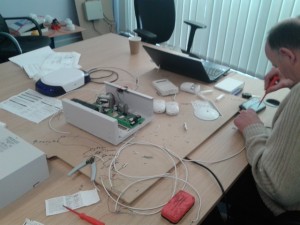Wired and wireless alarm system
Introduction to alarm systems
Alarm systems are another monitoring system like CCTV. The system is built for many varied and multi utility purposes. It can be for unauthorised entry or it can also be for many serious security issues like break ins. Some of the worried parents even install the alarms for monitoring their children’s in and out timings. This is not a very good process but quite effective, some parents do claim so. Whatever be the purpose most of the security alarm systems operate on some basic guidelines. Their monitoring can be through infrared activation where any animal with distinct body temperature will be noticed and start off the alarm, it can also be LASER netting or position monitoring where the net or position of doors or windows is breached to start the alarm. There can be wired connections, wireless connections or hybrid of wired and wireless connections in installing this alarm.

Alarm installation course
Wired and wireless alarm system
The connections from the sensory part of the system to the main console for monitoring can be either through wired or wire connections. There are advantages for both and depending upon certain factors one of them is chosen. In wired connections there will be continuous wire chain to transmit the sensor response and in wireless connections it can be through any of the air or vacuum dependent transmission systems. Infrared transmission, electromagnetic waves or any other. This also depends on certain conditions like people movement through the area, surveillance area whether small or large and prospective threats for the alarm.
Advantages and disadvantages of wireless connections
The first advantage is the aesthetic senses protection. Every time there is any fault the installation does not require to take all wirings out and check, second is the suitability for small places like apartments where there are limited people movement. Since the alarms are designed to protect something valuable it is necessary that they are always on, in wireless connection this will require continuous power supply and if for any reason there is drop in battery power then the signal or sensor may not work properly. The chances of false alarm are very high in this and that is one vital reason for people to avoid it in high security region.
Advantages and disadvantages of wired connection
For wired connections one has to define certain areas for wire laying so that every that there is any change of décor the complete flooring and other work is not required to be redone. The second advantage is that since all transmission is through wired connection there is no limitation on distance, it can reach any distance provided threats of damaging the wire is minimal or one will have to install added monitoring units at certain points. The chance of false alarm is minimal in this installation and that is the prime reason most of the professionals prefer to have wired connections for their alarms. If one is foresighted enough to make provisions for the wired while construction even the slight objection of spoiling interior get up is also eliminated.
Conclusion
Safely this can be said that wired connections are more secured but if one wants to change or move the location of monitoring then wireless is better. For large area coverage wired system is better, for small area wireless is better but even then wired connections are more trustworthy, but there are also considerations of choice of the installer and the monetary considerations, that will take the final call.
